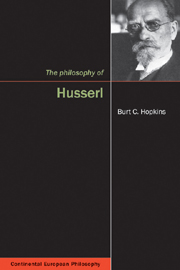Book contents
- Frontmatter
- Contents
- Acknowledgements
- Abbreviations
- Prolegomenon: Husserl's turn to history and pure phenomenology
- I Plato's and Aristotle's theory of eidē
- II From descriptive psychology to transcendentally pure phenomenology
- III From the phenomenology of transcendental consciousness to that of monadological intersubjectivity
- IV From monadological intersubjectivity to the historical a priori constitutive of all meaning
- 11 The pure phenomenological motivation of Husserl's turn to history
- 12 The essential connection between intentional history and actual history
- 13 The historicity of both the intelligibility of ideal meanings and the possibility of actual history
- 14 Desedimentation and the link between intentional history and the constitution of a historical tradition
- 15 Transcendental phenomenology as the only true explanation of objectivity and all meaningful problems in previous philosophy
- V The unwarranted historical presuppositions guiding the fundamental ontological and deconstructive criticisms of transcendental philosophy
- Epilogue: Transcendental-phenomenological criticism of the criticism of phenomenological cognition
- Coda: Phenomenological self-responsibility and the singularity of transcendental philosophy
- Notes
- Bibliography
- Index
15 - Transcendental phenomenology as the only true explanation of objectivity and all meaningful problems in previous philosophy
from IV - From monadological intersubjectivity to the historical a priori constitutive of all meaning
- Frontmatter
- Contents
- Acknowledgements
- Abbreviations
- Prolegomenon: Husserl's turn to history and pure phenomenology
- I Plato's and Aristotle's theory of eidē
- II From descriptive psychology to transcendentally pure phenomenology
- III From the phenomenology of transcendental consciousness to that of monadological intersubjectivity
- IV From monadological intersubjectivity to the historical a priori constitutive of all meaning
- 11 The pure phenomenological motivation of Husserl's turn to history
- 12 The essential connection between intentional history and actual history
- 13 The historicity of both the intelligibility of ideal meanings and the possibility of actual history
- 14 Desedimentation and the link between intentional history and the constitution of a historical tradition
- 15 Transcendental phenomenology as the only true explanation of objectivity and all meaningful problems in previous philosophy
- V The unwarranted historical presuppositions guiding the fundamental ontological and deconstructive criticisms of transcendental philosophy
- Epilogue: Transcendental-phenomenological criticism of the criticism of phenomenological cognition
- Coda: Phenomenological self-responsibility and the singularity of transcendental philosophy
- Notes
- Bibliography
- Index
Summary
Scope and limits of Husserl's reactivation of the sedimented origins of the modern spirit
For Husserl, philosophy, as the universal science of what is, has but one goal: intuitive knowledge of what is. As we have seen, both what in the world the formalized meaning formations of mathematical physics refer to, and therefore make intuitable, and how in the world this reference and corresponding intuition is possible, are obscure on Husserl's view. He traces this obscurity to the fact that the formalized meaning in modern mathematics is made possible by the progressive “emptying of its meaning” (Crisis, 44/44) in relation to the “real” (Crisis, 35/37), that is, to the intuitive givenness of the things manifest to everyday sense experience in the surrounding world. Husserl's historical reflection on the beginnings of the development of modern, Galilean science reveals that it is first made possible by this progressive emptying of meaning. The meaning formations of the mathematics that make physics possible are themselves made possible by their “becoming liberated from all intuited actuality” (Crisis, 43/44), including the “magnitudes” (Crisis, 44/44) that “numbers are supposed to signify” and of course from the intuitively given shapes of actual things. More precisely, the ideal shapes of Euclidean geometry are substituted for the intuited shapes of things, while algebraic calculation with ““symbolic’ concepts” (Crisis, 48/48) that express numbers in general – as opposed to determinate numbers – excludes the “original thinking that genuinely gives meaning to this technical process and truth to the correct results” (Crisis, 46/46).
- Type
- Chapter
- Information
- The Philosophy of Husserl , pp. 204 - 215Publisher: Acumen PublishingPrint publication year: 2010

